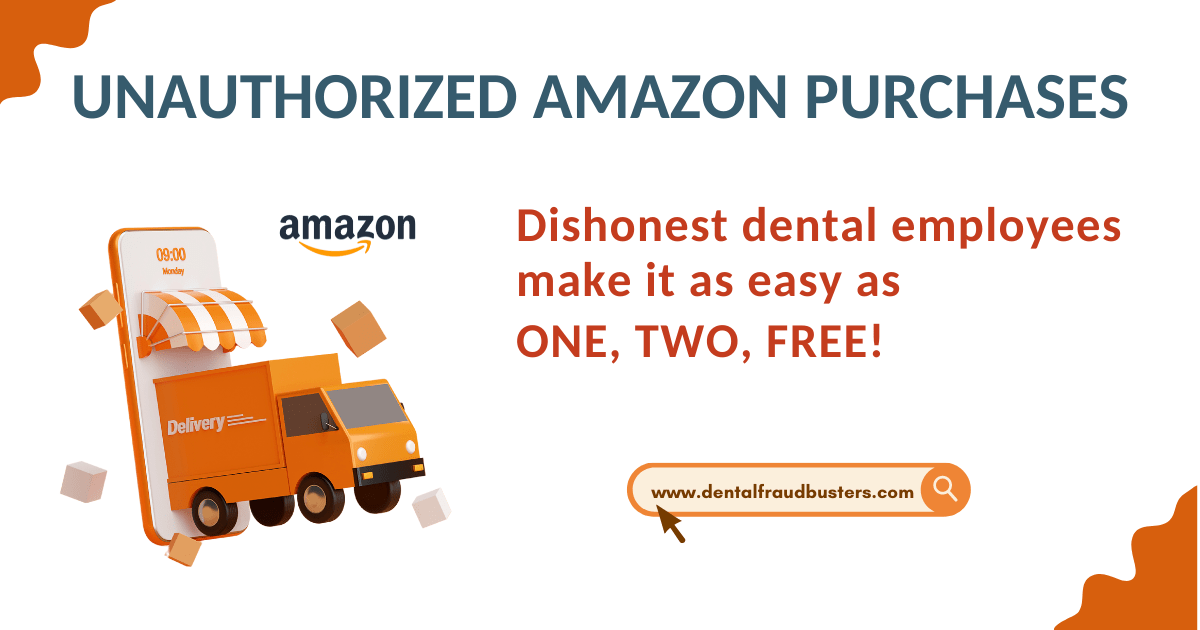Using Amazon to Steal from a Dental Practice
Posted:
Last Updated:
Many dental practice owners enjoy the convenience of ordering items from Amazon for their business.
Amazon makes it easy to order and allows users to store multiple credit cards and multiple delivery addresses on their accounts.
For example, my own personal Amazon account has different credit cards on file, and all my family addresses. This allows me to purchase items on Amazon and have them delivered directly to a family member as a gift.
Fraudulent Amazon purchases
A few years ago, I encountered my first case involving fraudulent Amazon purchases. In that case, an employee used the practice’s Amazon account to order $16,000 in supplies over several months (delivered to her home address) for her side-hustle business selling handmade items. I’ll just leave this here.
Since that time, I’ve encountered many other cases of fraudulent Amazon purchases by employees, and from that I can say:
- It appears common for practice owners to delegate ordering items from Amazon to an employee.
- Most of the cases of fraudulent Amazon purchases involved losses less than $20,000
- All of the Amazon cases were co-morbid with larger fraud schemes, such as skimming, larceny, or check fraud. (i.e: Amazon was just the tip of the iceberg)
How to prevent fraudulent Amazon purchases in your dental practice

The easiest way to prevent this type of purchase fraud is to never share your Amazon logon name and password with employees.
In other words, you do not allow any employees to use practice’s Amazon account. This can be inconvenient for owners, so if you do allow employees to order items from Amazon, you should perform these checks at regular intervals.
(1) Review the information on your Amazon account.
Every 3 or 4 months verify the following on your Amazon account:
- linked credit cards
- shipping addresses
- billing addresses
- email address
- phone numbers
Make sure that all the information contains the correct details. If any information has been changed, screen capture it before you make corrections. If the changes cannot be reasonably explained, call Amazon security department and report that your account information was changed without your knowledge.
(2) Examine your “Purchase History” and “Archived Orders”.
Check your recent orders. Do you recognize them? Check the “archived orders” section because this is where people tend to hide their fraudulent purchases. You can find this section on “Ordering and Shopping Preferences”.
(3) “Unlink” for added protection against unauthorized purchases
For added security, “unlink” your credit cards. Unlinking all of the payment methods stored on your Amazon account will require you to enter your card info each time you make a purchase.
Employees can use the account to add multiple items to the shopping basket, but they cannot complete the order. You will need to manually approve the orders by entering your credit card information. (can be done once each day, twice a week, etc)
Recommended (best) method to prevent fraudulent Amazon orders
Sign up for a free Amazon Business account.
This will allow you to separate your personal Amazon purchases from your Amazon Business account purchases.

After creating your Amazon business account, you will be able to:
- Restrict who can approve orders. A designated order-approver (i.e.: you) will receive a notification each time an employee places an order request. You can then “click and approve”
- Delegate order approval to a temporary approver for times when you are out of office.
- Set restrictions to prevent users from purchasing items from certain categories.
In Related News
Kristy Staley was a 42-year employee of McCollum’s dental practice in Dillon MT, and her name was on his business credit card for office purchases.


